
Germany - electric multiple units of DB AG
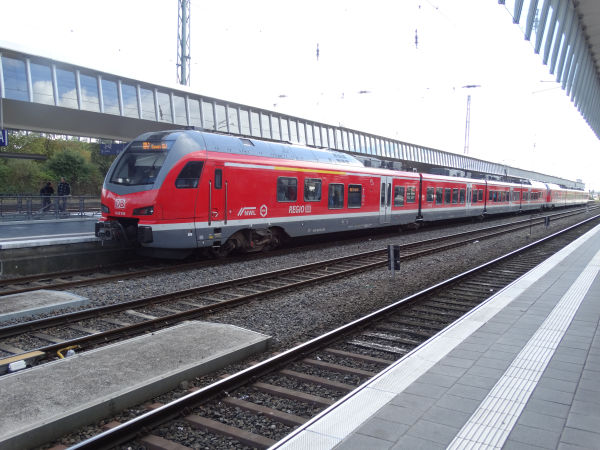
A major part of passenger train traffic in Germany is nowadays hauled by
electric multiple units. This one is a fairly rare type - at least in DB's colours. It is a third generation FLIRT train
of Br 1428 built by the Swiss company Stadler. DB does not have many Stadler built trains, but they are very common at
private railroad companies. Photo at Münster Hauptbahnhof 8.10.2016 by Ilkka Siissalo.
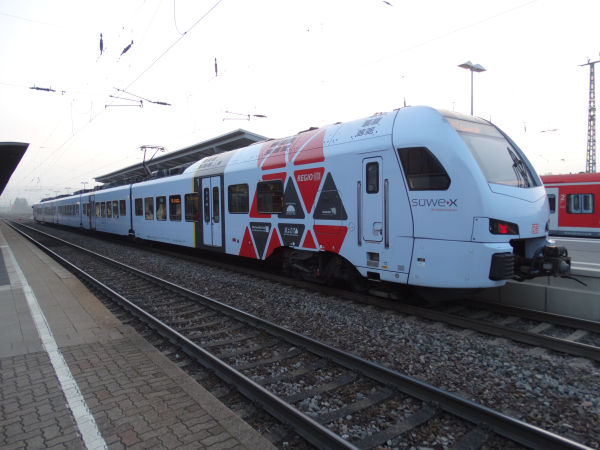
Almost all of DB's EMU trains are painted red, but not quite. These class 429 trains of the Süwex service have just a small
red patch. Essentially this train is identical with the class 1428 shown at the top of this page. It is classed as Br 429
but it is also a Swiss Stadler FLIRT of 3rd generation just like the Br 1428. The Süwex service connects
the western state of Saarland with cities such as Mainz, Ludwigshafen and Karlsruhe in the east. Picture 17.12.2016 at
Saarburg station by Ilkka Siissalo.
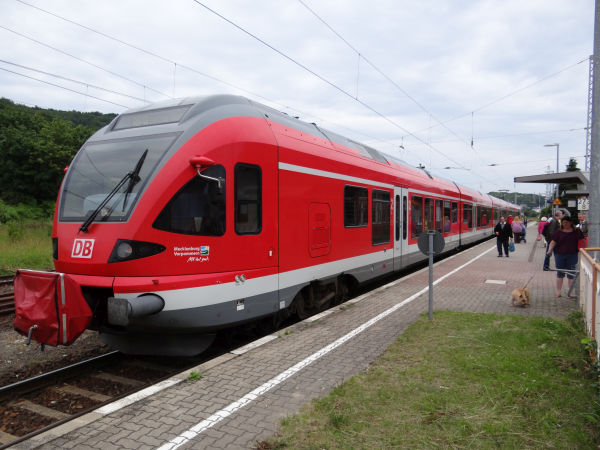
This one is also called Br429 and also this one is a Stadler FLIRT, but this is a first generation FLIRT paid and owned by the
Mecklenburg-Vorpommern state. Here it has just arrived as a regional train to the Sassnitz station on the island of Rügen on the very
northeastern corner of Germany.
Picture from Sassnitz station 3.7.2013 by Ilkka Siissalo.
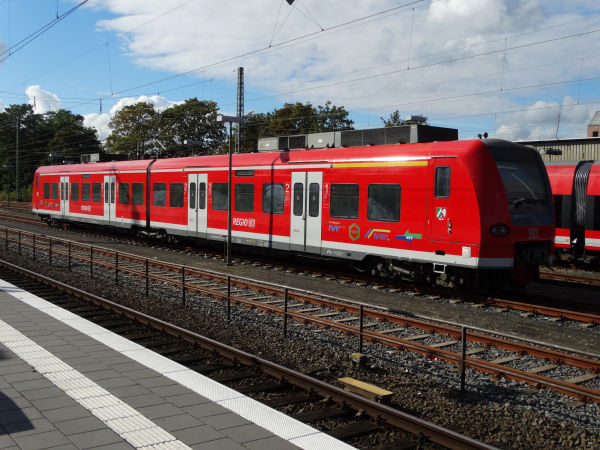
The class 426 is a two coach variant of a common regional train. The most common variant is the class 425, which has four
coaches. These trains were built by a consortium including Bombardier, Siemens and DWA 1999-2008.
Picture from Münster Hauptbahnhof 8.10.2016 by Ilkka Siissalo.
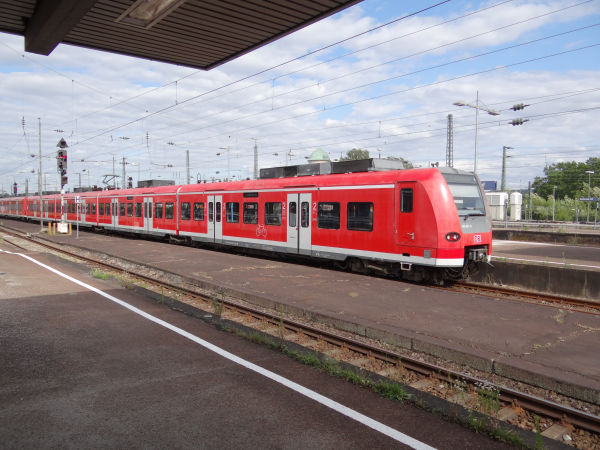
This is the class 425. It is similar to the class 426 shown above, but with four coaches. It is one of the most common EMU
types in Germany.
Picture of two four coach Br 425 units at Karlsruhe Hauptbahnhof 8.7.2015 by Ilkka Siissalo.
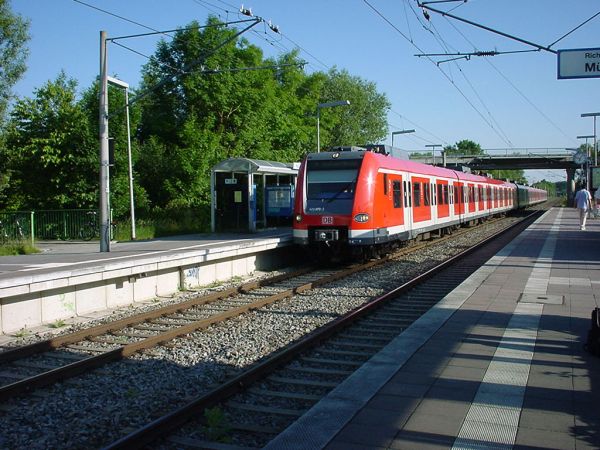
This is class Br423. It is otherwise quite similar to the class 425 shown above, except that this one has three pairs of doors on
all of its four coaches. This version was designed for short distances with really a lot of passengers going in and out all the time.
Here we see two of them as an S-Bahn train connecting the München (Munich) International airport to the city of München.
Picture from the S-Bahn stop Hallbergmoos 14.6.2002 by Ilkka Siissalo.
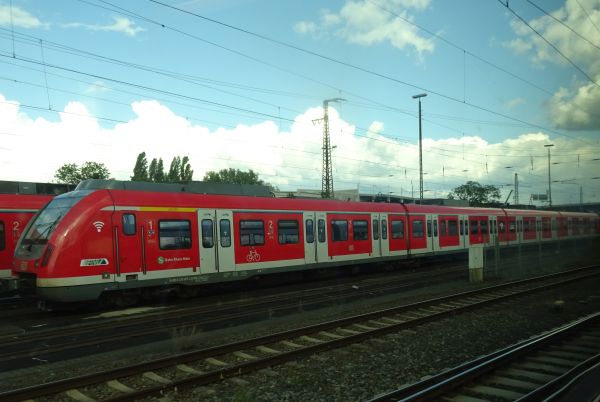
Class Br430 is a further development of the earlier Br423. It's main difference is the so-called crashproof front. But just like the Br423
this type is also intended for urban areas with a lot of stations close to each other and a lot of people coming and going.
Picture from Hanau Hauptbahnhof 29.5.2022 by Ilkka Siissalo.
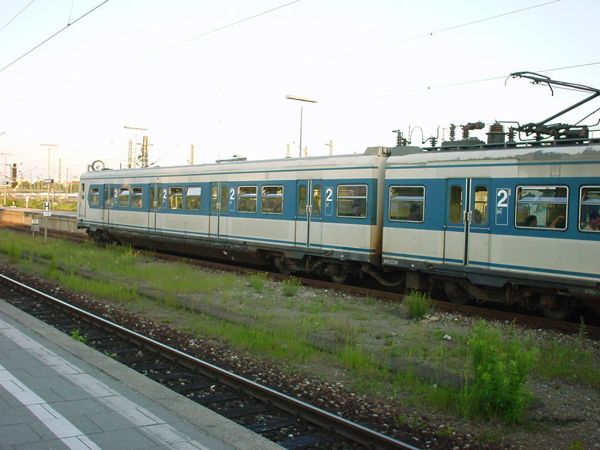
This was the precursor of the Br 423 trains shown above in the München area. This is a Br420 multiple electric unit, still in its
original colours of 1972. In the 1970s these were known as "Olympiazüge", Olympic trains, as they were taken first in use just before
the Olympic games in München in 1972. They were once already all taken away from daily use, but now as this is being written, some
of them are still in active use in 2021. Their main problem is the lack of any airconditioning. A few of these Br420 trains have been
medernised to become what is called Br420plus, but there are by far too few of them for the present need. Only in the München area
these trains were painted blue and light grey, whereas in the Ruhr area similar trains were in orange and grey. Most trains of this
class are now in the Verkehrsrot new red livery, but some are even in the München area to be seen in the orange and light grey colours
since some trains were moved from the Ruhr area to München.
Picture from the Donnersbergerbrücke S-bahn stop near München Hauptbahnhof 14.6.2002 by Ilkka Siissalo.
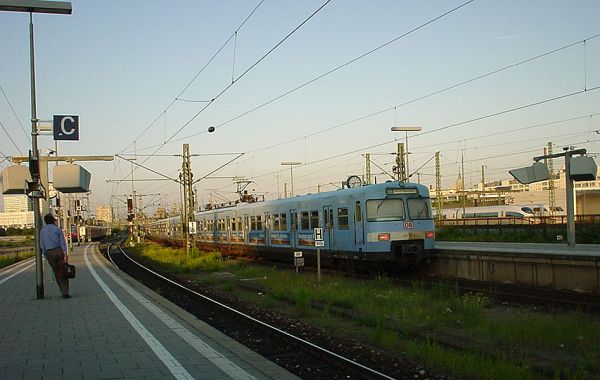
For many years some of these Br420 trains of the München area were painted in a special livery, light blue with a very large "M"
at the sides of the train. These were the airport trains before the Br423 red new trains shown above emerged.
Picture from the Donnersbergerbrücke S-bahn stop near München Hauptbahnhof 14.6.2002 by Ilkka Siissalo.
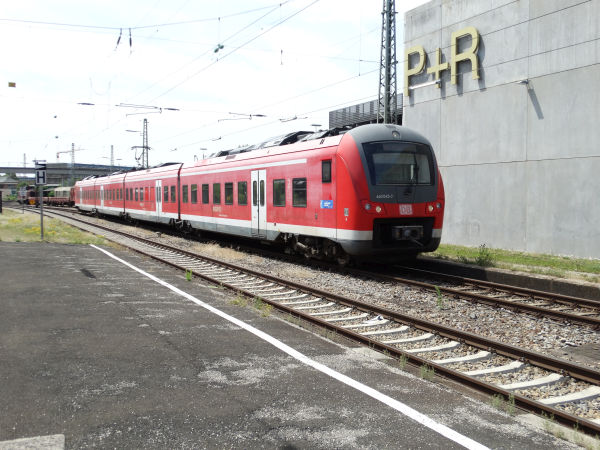
Class 440 electric multiple unit approaching Nördlingen station. Class 440 is Alstom's so called Coradia Continental. Passengers just
hate these trains. They have just one narrow pair of doors per wagon and the corridors are very narrow, so getting in and out is very
difficult. And the chairs are packed so close together that long-legged passengers can't fit their feet in the little space given.
These trains are being used especially in the south, in Bayern (Bavaria).
Picture from Nördlingen 3.7.2019 by Ilkka Siissalo.
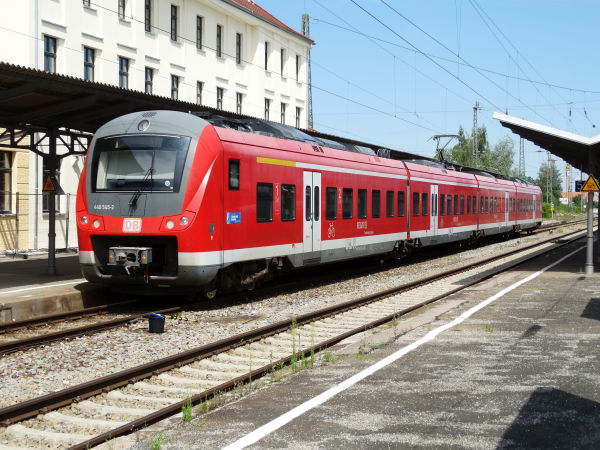
The same class 440 Coradia Continental as shown above. Due to their flat face these trains bear the nickname "mops".
Picture from Nördlingen 3.7.2019 by Ilkka Siissalo.
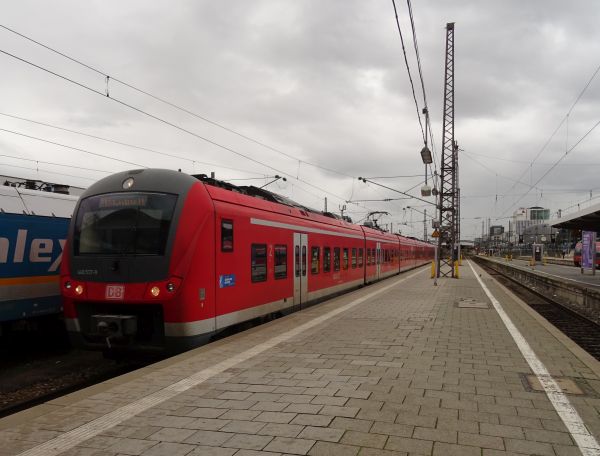
A Regionalexpress train composed of two class Br 440 Coradia Continental units is approaching the station.
Picture from München Ostbahnhof 14.10.2022 by Ilkka Siissalo.
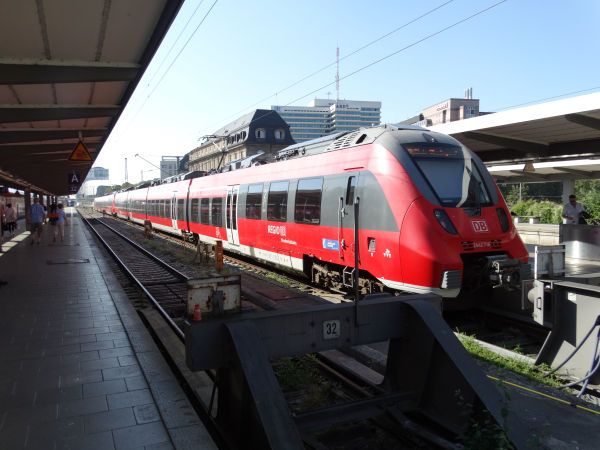
This is a class 2442 Bombardier Talent 2. Don't please ask me what the difference between a class 442, 1442, 2442 or 9442 is,
because there is no sensible and logical explanation. Anyway, this is a Bombardier Talent 2, four coaches, a fairly new regional
train.
Picture from München Hauptbahnhof 13.9.2016 by Ilkka Siissalo.
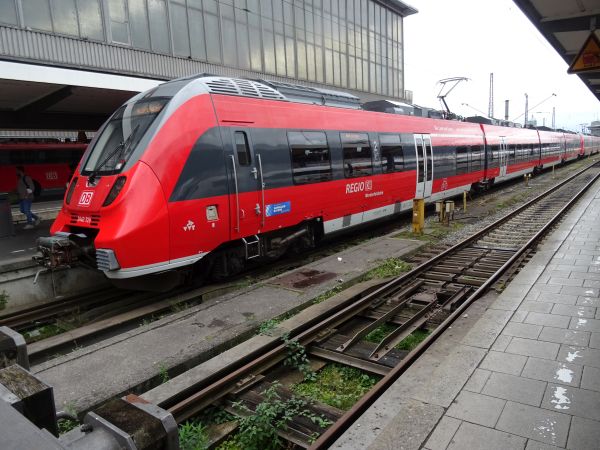
A regional express train composed of two Talent 2 units of Br 2442, similar with the one shown above.
Picture from München Hauptbahnhof 14.10.2022 by Ilkka Siissalo.
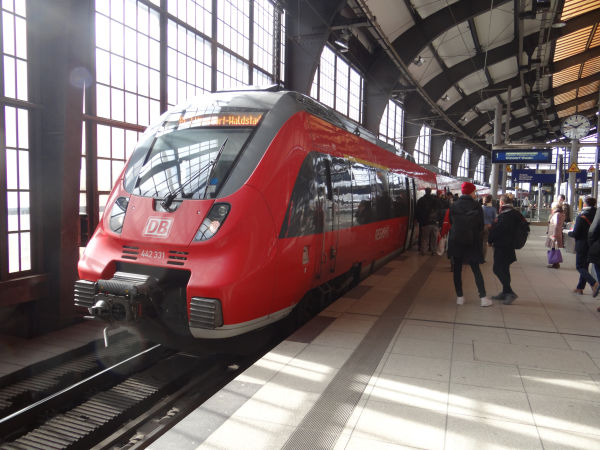
Another four coach long Bombardier Talent 2, but this time classified as Br 442.
Berlin Hauptbahnhof 4.3.2016. Picture by Ilkka Siissalo.
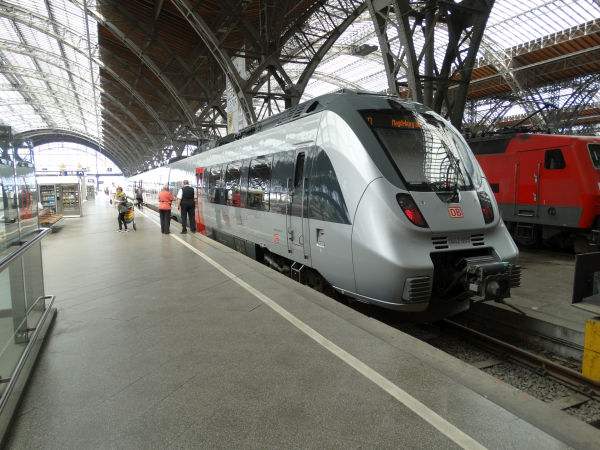
Yet another Talent 2 train of DB, but this is in the local grey colours of the Mitteldeutschland region and is now called
Br1442.
Picture from Leipzig Hbf 16.7.2018 by Ilkka Siissalo.
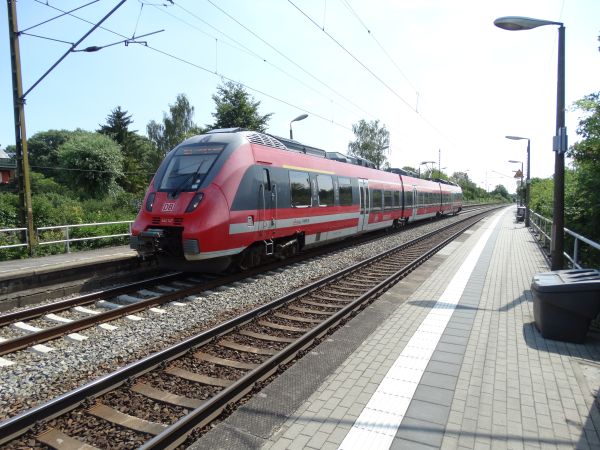
This is also a Talent 2 train of DB belonging to the class Br442, but this one is from the local and regional traffic around the city of Dresden.
In Dresden area the trains have a broad extra white band along their "belly".
Picture from Dresden-Stetzsch 16.7.2018 by Ilkka Siissalo.
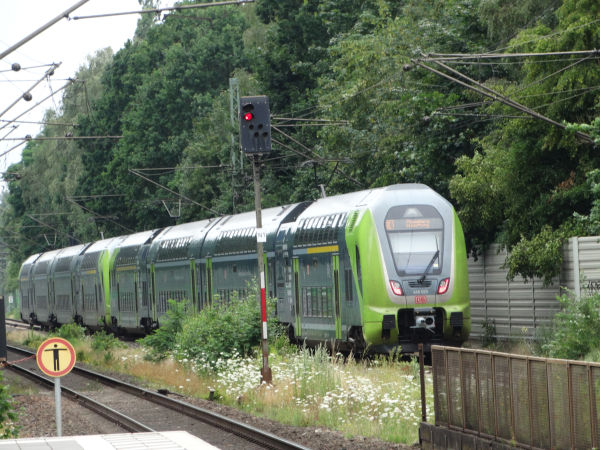
It's no longer a rule that all DB Regio trains would be red. This new doubledecker regional express train from Hamburg to Quickborn is a DB train
but it is in the colours of NAH.SH, that is the local trains of the state of Schleswig-Holstein and the state is now defining the colours of the
trains they are paying for. This composition consists of two four coach doubledecker trains of the new type Br445 built by Bombardier. Here we
see the train rushing very fast past the little station of Tornesch somewhat northwest of Hamburg.
Picture from Tornesch 14.07.2019 by Ilkka Siissalo.
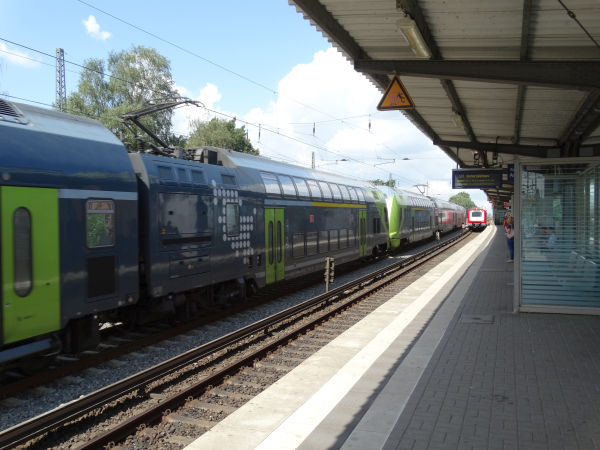
Side view of a new Br445 train. The Br445 is a fixed four coach set where the end wagons are motorised and the middle coaches are like any
earlier Bombardier made doubledecker coaches.
Picture from Hamburg Eidelstedt 1.7.2019 by Ilkka Siissalo.
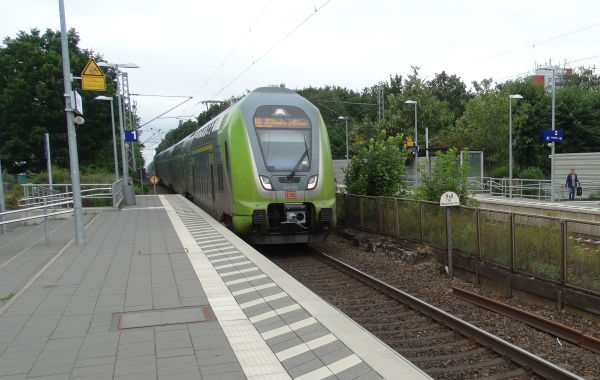
A regional express train consisting of one four coach Br445 unit is passing at high speed the small station of Tornesch on its way towards Hamburg.
Picture from Tornesch 14.07.2019 by Ilkka Siissalo.
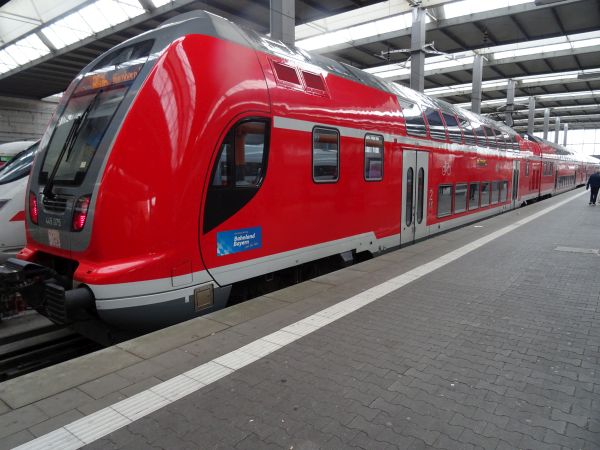
A similar Br445 doubledecker train as the ones shown above, but this time in classical DB red.
Picture from München Hauptbahnhof 14.10.2022 by Ilkka Siissalo.
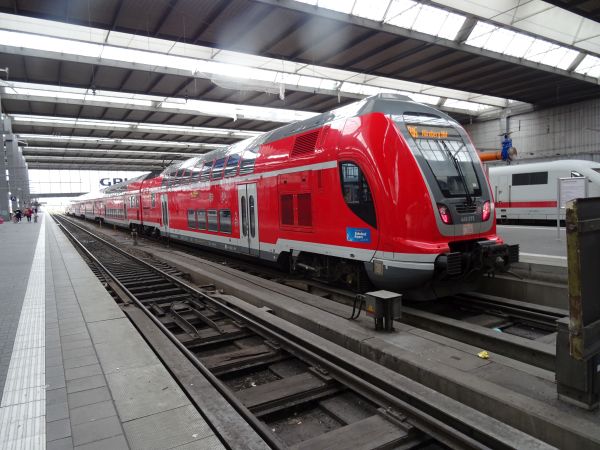
The same Br445 Bombardier Twindexx train as in the picture above. These new EMU trains look like just a set of doubledecker coaches without
a locomotive. This first wagon in fact is the locomotive, but it doesn't look like being one.
Picture from München Hauptbahnhof 14.10.2022 by Ilkka Siissalo.
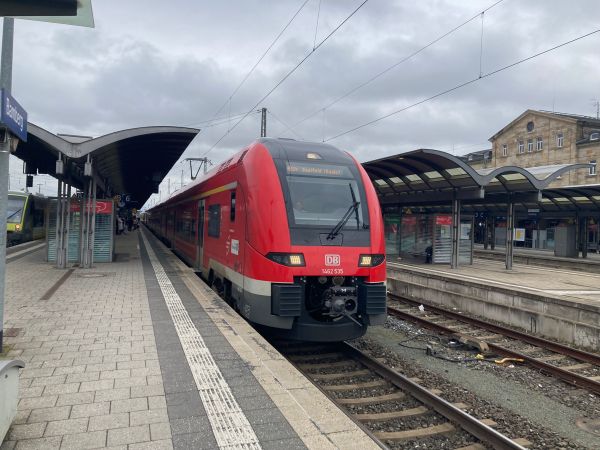
This train is of a new and still rare type. It is a Siemens Desiro HC (HC stands for high capacity). The first and last coaches are single floor
but the two middle coaches are doubledeckers.
Picture from Bamberg 3.2.2024 by Johannes Erra.

